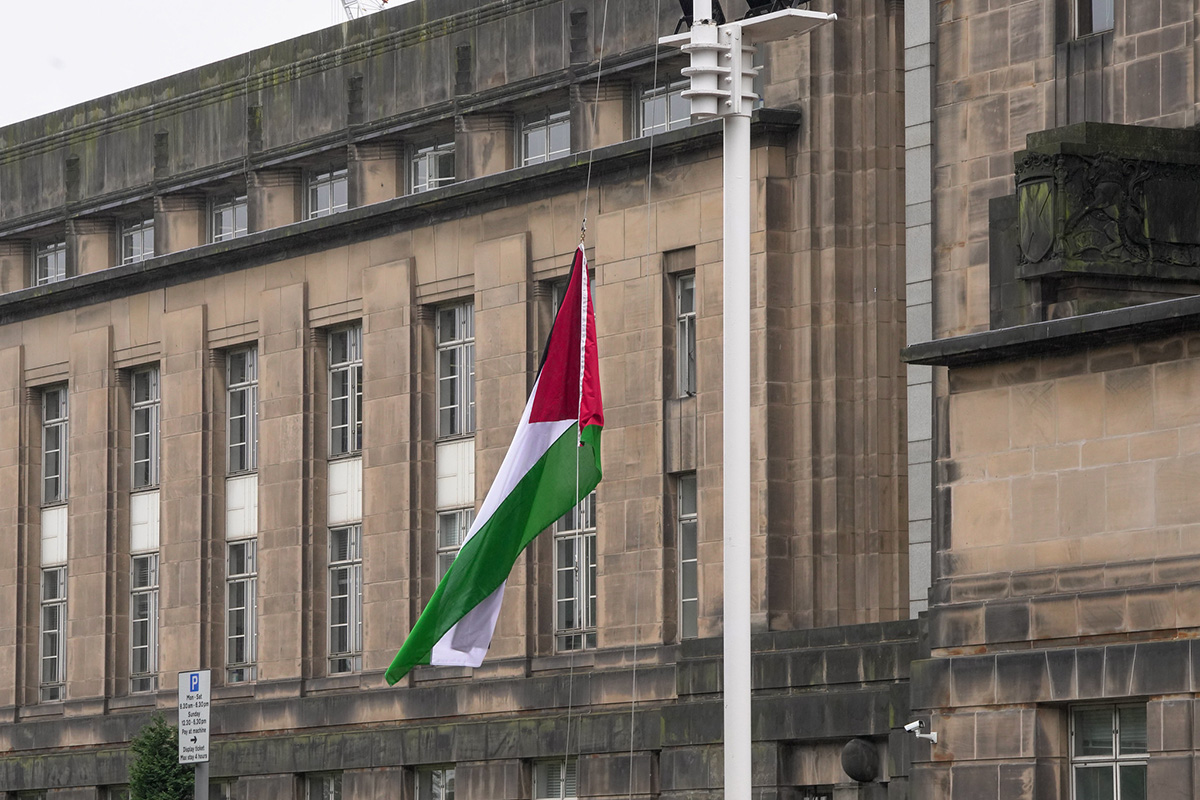Students and workers sympathetic to the ideas of Marxism have founded a Marxist Society at the University of Edinburgh after holding several successful meetings with the help of Socialist Appeal supporters. The arrival of a forum for Marxist ideas on such an important campus comes as British capitalism continues to decline and Tory cuts bite. The economic crisis is deepening and the effects are beginning to be felt everywhere, including Edinburgh, where many workers across the city are being threatened with wage cuts, worsening conditions, and lay-offs.
Students and workers sympathetic to the ideas of Marxism have founded a Marxist Society at the University of Edinburgh after holding several successful meetings with the help of Socialist Appeal supporters. The arrival of a forum for Marxist ideas on such an important campus comes as British capitalism continues to decline and Tory cuts bite. The economic crisis is deepening and the effects are beginning to be felt everywhere, including Edinburgh, where many workers across the city are being threatened with wage cuts, worsening conditions, and lay-offs.
For young people living in Edinburgh, unemployment is a growing and serious problem. The lack of new, full-time posts in Edinburgh reflects the city’s vulnerability as a predominantly service-based economy and the scale of the crisis we are living under. The curse of unemployment for young people means an uphill struggle of trying to get by while the gap on their CV grows and job prospects dim. For university and college graduates this problem is most acute, as the few jobs available in their fields become harder to reach as time passes by. Exacerbated, some give up on using their qualifications and “just look for anything”. The government encourages this de-skilling by forcing young jobseekers to take unpaid work placements and pressuring them to look for any kind of work imaginable.
Worse still, even work in the service sector is disappearing. The recent fall of several high street retailers after Christmas has seen many Edinburgh jobs disappear, including at every HMV store in the city. For many, under-employment is becoming a bigger and bigger problem, where cutting hours is seen as an appropriate response to the worst Christmas and Hogmanay sales in years. Temporary employment is also a big issue with jobs being available only during the winter and summer festivals and then drying up the rest of the year.
The cuts to education and the re-introduction of fees for students in the rest of the UK are an ominous sign of what young people can expect under capitalism. A whole generation now have to come to terms that their prospects will be worse than those faced by their parents’ generation. Even adult education courses have been disappearing across the city, leaving possibilities of re-training unlikely.
Furthermore, the Scottish winter has become tougher to bear as prices in rent and fuel costs rise ever higher. Recently British Gas happily announced that profits were up thanks to the severity of the winter! Furthermore, the real austerity has only just begun, with under 20% of the announced cuts having been implemented so far. Council tax benefit and housing benefit are also being cut; a cut that is disproportionally deeper for young people under 35.
 The Edinburgh tram fiascoThe reality is that the working class in Britain faces years, if not decades, of austerity with little or no growth. For young people, a future under capitalism is becoming increasingly unacceptable. Politicians in Edinburgh continue to make a fool of themselves after the corruption and incompetence surrounding the building of the Scottish Parliament and the trams system. Nationally, both the Yes and the No campaigns for Scottish independence offer a worryingly unconvincing solution to the problems of workers.
The Edinburgh tram fiascoThe reality is that the working class in Britain faces years, if not decades, of austerity with little or no growth. For young people, a future under capitalism is becoming increasingly unacceptable. Politicians in Edinburgh continue to make a fool of themselves after the corruption and incompetence surrounding the building of the Scottish Parliament and the trams system. Nationally, both the Yes and the No campaigns for Scottish independence offer a worryingly unconvincing solution to the problems of workers.
Clearly we need to fight against such exploitation and robbery. In Spain and Greece, where matters have come to head much quicker, we can see the future perspective for Britain. In these countries, any attempt to rebalance the economic order results in further destabilising the social and political order. No matter which way the ruling class of these countries turn the situation gets worse. Britain may be an island, but it is not safe from this crisis. The British economy has already lost its Triple-A credit rating with the rating agency Moody’s and fears about British debt are mounting.
Across Britain we are seeing the beginning of a fightback, with a general strike being discussed in the trade unions and Labour Party councillors in Hull and elsewhere refusing to vote for the cuts. In Edinburgh, the growing Spanish community have imported the radical class consciousness that has been established in Spain. The N-14 demonstration, organised in Edinburgh by Socialist Appeal supporters and young Spanish émigrés, saw hundreds of youth marching in solidarity with the european strike taking place on the same day. Now there are demonstrations planned against the new bedroom tax being implemented in April in tandem with other protests across the UK.
The arrival of the Marxist Society at the biggest university in Edinburgh could not, therefore, have come sooner. Marxists understand that the root cause of all of these problems is the way that the resources of society are owned and controlled by private interests. Understanding why the crisis occurred and why the cuts are being made allows us to prepare a programme to counter them. However, it is important not just to understand capitalism and all its failures, but also to build the organisations that can remove it, including Marxist societies and discussion groups, but also the trade unions and importantly, the revolutionary party.
 Meeting of the Edinburgh Marxist societyThe Marxist society will contribute to this struggle by raising the banner of Marxism, and recruiting people to it, wherever possible: both inside campus, holding discussions and debates and taking part in student politics, and outside campus, intervening in the broader class struggle by attending demonstrations, visiting pickets, and linking up with local campaigns.
Meeting of the Edinburgh Marxist societyThe Marxist society will contribute to this struggle by raising the banner of Marxism, and recruiting people to it, wherever possible: both inside campus, holding discussions and debates and taking part in student politics, and outside campus, intervening in the broader class struggle by attending demonstrations, visiting pickets, and linking up with local campaigns.
The Marxist Society has a lot of potential, filling a vacuum on campus and across the city as a place where young people and workers can discuss radical ideas and begin to fight back. It represents a crystallisation of discontent with capitalism and a willingness to build around a programme that can see such a useless system overthrown and the basic problems of workers and youth solved.






